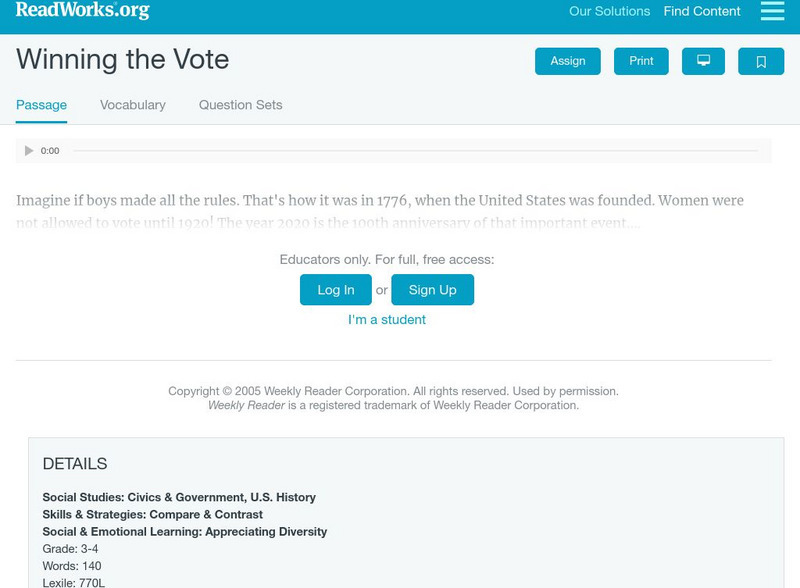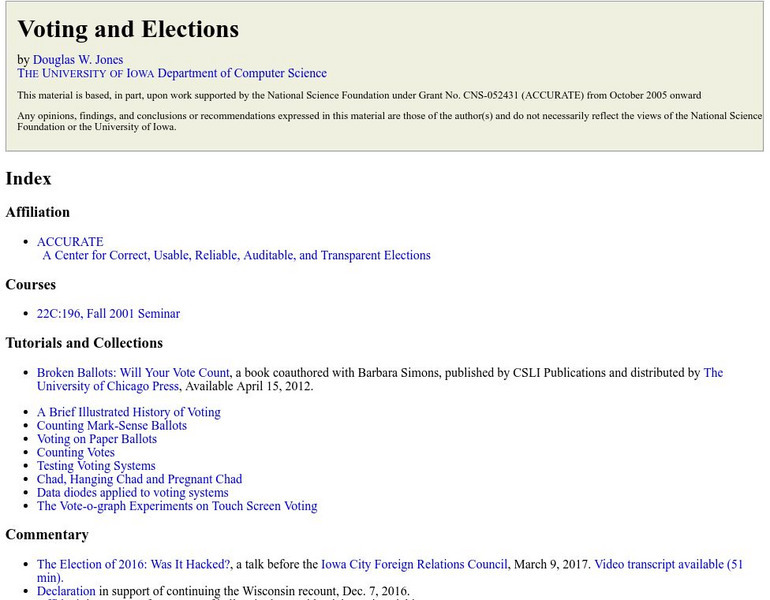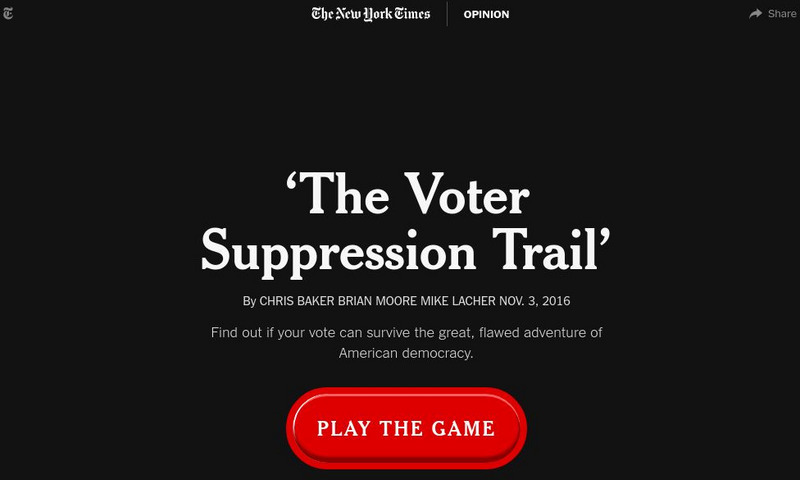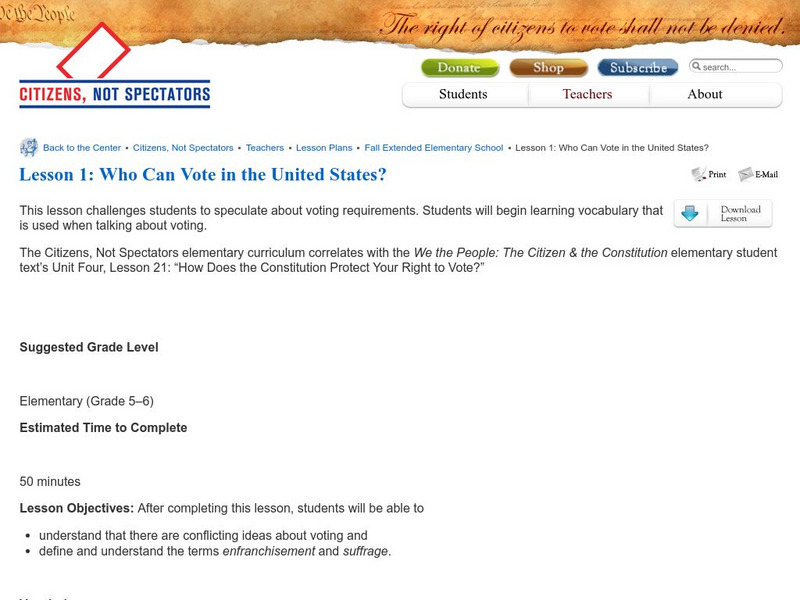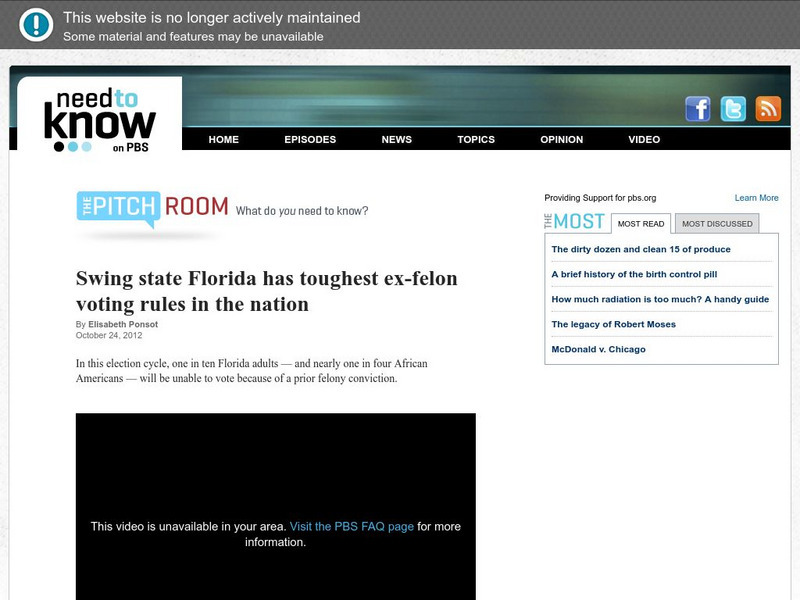Read Works
Read Works: Winning the Vote
[Free Registration/Login Required] An informational text about the women's suffrage movement working to gain the right to vote for all women. A question sheet is available to help students build skills in reading comprehension.
Library of Congress
Loc: America's Story: 10 Suffragists Arrested, Picketing
Wives, mothers, and grandmothers were arrested outside the White House! Learn the circumstances behind this story in this 3 page article as they protested for the right to vote. Photographs and actual programs can be seen here.
University of Iowa
University of Iowa: Voting and Elections
Although this site from the University of Iowa seems to be an outline for a course, it offers many tutorials such as "A Brief Illustrated History of Voting" and "Chad, Hanging Chad and Pregnant Chad." Most of the site, however, is...
Other
Nes Guide to Public Opinion and Electoral Behavior
Since 1948, the National Election Studies group has been polling Americans on public policy issues. Information is presented statistically and graphically on a wide range of topics involved in the "flow of public opinion and electoral...
New York Times
New York Times: The Voter Suppression Trail
[Free Registration/Login Required] Great learning "game" to help people understand the difficulties many people face when they want to vote in the United States. Based on the infamous Oregon Trail video game, see if your selected person...
Center For Civic Education
Center for Civic Education: Who Can Vote in the United States?
This lesson challenges students to speculate about voting requirements. Students will begin learning vocabulary that is used when talking about voting.
Center For Civic Education
Center for Civic Education: Becoming a Voter
In this lesson, students apply their state's requirements for registering to vote. Students learn when and how to register, how to complete a voter registration form, and when and how to reregister.
Center For Civic Education
Center for Civic Education: Becoming a Voter
In this instructional activity, young scholars apply their state's requirements for registering to vote. Students learn when and how to register, how to complete a voter registration form, and when and how to reregister.
US Government Publishing Office
Ben's Guide to u.s. Government: Elections: Voter Registration
Can you vote in Election 2008? View this guide to see historical facts and where to register to vote in Federal elections. Includes links to further information.
Other
Streetlaw: Introduction to Law and the Legal System
This website, a unit introducing the law and legal system, is organized into six chapters where you can learn about laws, lawmaking, citizen advocacy, dispute settlements, the court system, and lawyers.
Polk Brothers Foundation Center for Urban Education at DePaul University
De Paul University: Center for Urban Education: Making a Difference [Pdf]
"Making a Difference" is a one page, fictional, reading passage about students helping to get their families and others to register to vote. It is followed by constructed-response questions which require students to provide evidence from...
Other
Civil Rights Teaching
Online companion to the book "Putting the Movement Back into Civil Rights Teaching", but many useful resources for any classroom.
Harry S. Truman Library and Museum
Every Four Years: Electing a President
This exhibition examines Presidential elections, with a particular emphasis on elections in the last 80 years.
Other
The Center for Voting & Democracy: Gerrymandering
This site provides a brief description of the term gerrymandering and where the term originated.
PBS
Pbs Learning Media: Election Central: Inside the Voting Booth
"Voting Time Machine," which presents case studies from different decades introduces students to the history of suffrage in America. Students prepare for the time when they can to vote through a customized, printable voter registration...
National Geographic
National Geographic: The Electoral College
Discover how the United States elects its president by using an Electoral College. A map shows how the Electoral College's 538 members are distributed throughout all fifty states and the District of Columbia.
PBS
Pbs Need to Know: Florida Ex Felon Voting Laws
Did you know that one in ten adults in Florida is currently not eligible to vote due to having been convicted of a felony? Find out how African Americans in particular are disproportionately affected. Article has particular emphasis on...
Council for Economic Education
Econ Ed Link: The Economics of Voting
Since the 1960s, many Americans eligible to vote have not bothered to do so- not even in presidential elections. Low rates of participation in voting have been worrisome to people interested in preserving our democratic traditions....
Council for Economic Education
Econ Ed Link: The Economics of Voting: What Do You Mean My Vote Doesn't Count?
This lesson explores the costs and benefits associated with voting in national elections. Specifically, the concepts of rational apathy, rational ignorance and expressive voting are explained.
Alabama Learning Exchange
Alex: What Do You Need to Know to Vote in Alabama?
Registering to vote, gathering information about the candidates, and casting a vote at the polls are vital parts of the process of selecting elected officials. Students will understand how the registration process works and how to cast...
Alabama Learning Exchange
Alex: Why Vote?
Students will complete a web quest that includes reading material on the expansion of voting rights, viewing video on historical events related to suffrage, and completing a multimedia project (public service announcement). An extension...
Alabama Learning Exchange
Alex: Fact vs. Opinion
This lesson is a hands-on way for students to learn how to discern between fact and opinion. This is an important skill for citizenship in that citizens should be informed about what is happening in their communities and should take...
Alabama Learning Exchange
Alex: Who Will Be President?
This lesson will allow students to experience the election process of an American President through a mock election. Students will learn the steps that must be followed in order to have an election. This is a great way to get students...
Utah Education Network
Uen: Civics: Elections
Citizens of democratic countries consider voting one of their chief rights because it allows them to choose who will govern them. Learn about voting rights and the election process.
